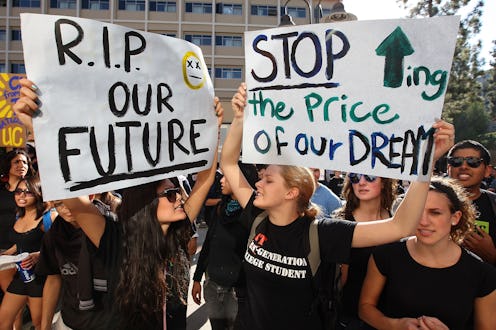News
An Expert Explains What’s Wrong With Trump’s Idea To Limit Student Loan Borrowing

As college costs soar and more employers look for job candidates who hold degrees, it can feel like taking on debt for higher education is a rite of passage akin to learning to drive. A new Trump administration student loan proposal claims it would offset that issue by limiting the amount of federal dollars that graduate students and parents are allowed to borrow, arguing that such a plan would lead colleges to curb their cost of attendance. But a higher education policy expert tells Bustle there is insufficient data to back up that claim.
Under the White House's proposal, which would amend the Higher Education Act, Congress would place limits on the amount of money that graduate students and parents of undergraduate college students are allowed to take out under the federal Direct PLUS loan program. The PLUS loan program is not available to undergraduate students; rather, it's something their parents can apply for in order to help cover their children's educational costs. The White House did not say in its proposal what the borrowing cap would be, but did argue that the availability of federal student loans has contributed to rising college tuition costs.
Jessica Thompson, director of policy and planning for The Institute for College Access & Success (TICAS), tells Bustle that there isn't enough data to justify such a policy. The notion that federal student loan programs may contribute to rising college costs has been around for decades, but Thompson says there's no proof to back that up. Plus, in her opinion, implementing it at this point would be too hasty.
"There's no strong evidence that shows a causal link between federal student loans and pricing at colleges," she says.
While experts have argued that there could be a connection between federal student loan availability and rising college costs, that's very different from claiming that the former causes the latter, Thompson explains. When it comes to the question of why college tuition costs are rising, she says there are other, more concrete factors to look at, like the fact that running an institute of higher education is so expensive.
"Professors, IT administrators, managers — these are highly, highly skilled laborers," Thompson says. She notes that paying all those employees, as well as providing benefits, really adds up.
As it stands, the government already caps borrowing for undergraduate students well below the cost of tuition for many four-year colleges. There are several variables at play, but generally speaking, the limits are $7,500 per year for students who are claimed as dependents on someone else's taxes, and $12,500 a year for students who are independent. Meanwhile, graduate students, as well as parents of undergraduate students, who are approved for PLUS loans may borrow up to the cost of attendance, which may also include living costs.
It's easy to see how allowing PLUS loan borrowers to cover the entire cost of attendance could put those individuals heavily in debt. But the available data suggests that those borrowers saddled with the highest amount of student loan debt might actually be at lower risk of defaulting on those loans than borrowers who owe smaller amounts.
"Defaults are concentrated among borrowers with small-volume loans, in large part because these borrowers are less likely to have completed their degrees," a report released by the Obama administration in 2016 found.
Suffice it to say, federal student loans often open doors that would otherwise be closed to lower-income students. Private lenders tend to have much stricter economic requirements for their borrowers, and are less likely to take risks on students who have fewer resources, according to Thompson.
In that vein, she explains that capping federal student loan borrowing could throw up barriers in front of those students who need financial assistance the most. Without loan programs that enable lower-income students to attend college, Thompson says that higher education could be impossibly expensive, preventing those students from enrolling at all. And while the student loan debt crisis is certainly significant, she argues that available information does not appear to support the Trump administration's claim that student borrowing is inflating the price of college tuition.
"We continue to look at the literature because this is a very compelling argument that has a lot of traction," Thompson says. "It feels right to a lot of people, but there just isn't a strong evidence base to support it as the primary problem."